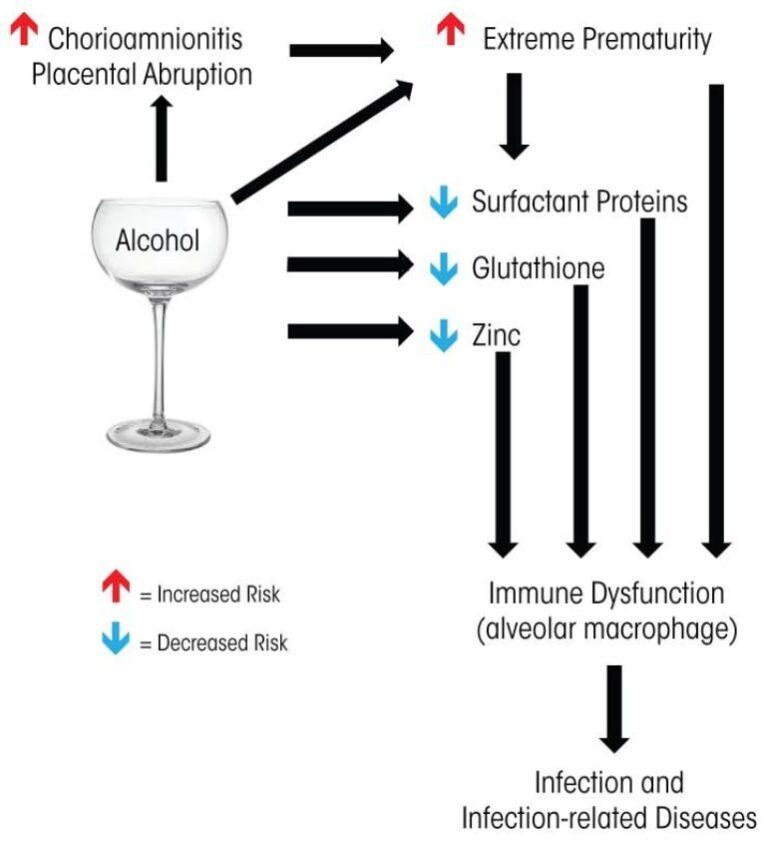Written by Brandon Okey. Mina Draskovic, B.Psy., reviewed this content for accuracy.
Fetal alcohol syndrome (FAS) is caused by drinking during pregnancy. It results in permanent physical, cognitive, and behavioral challenges in children and adults, including learning disabilities, memory issues, and difficulties with social interactions. A 2023 StatPearls clinical overview shows that FAS ranges from 6 to 9 cases per 1,000 births.
If you’re pregnant, skip alcohol entirely. Even small amounts can be risky for your baby’s health.
For anyone struggling with alcohol use, Ardu’s alcohol rehab program blends science-backed therapies with compassionate care to guide you toward lasting sobriety.
Fetal alcohol syndrome is a serious condition that affects babies exposed to alcohol before birth. It’s part of a broader group of conditions called fetal alcohol spectrum disorders (FASD). FAS causes lifelong physical, behavioral, and learning problems.
When a pregnant woman drinks, the alcohol passes through the placenta to the developing fetus. The fetus can’t process alcohol as efficiently as an adult, which increases blood alcohol concentrations. This exposure interferes with the normal development of the brain and other organs, especially during critical periods of growth.
FAS affects people throughout their lives. Many can lead fulfilling lives with the right care and understanding. With proper support, people with FAS can overcome challenges and achieve their goals, no matter when they’re diagnosed.
This condition is completely preventable by not drinking alcohol during pregnancy, not even a drop. There’s no known safe amount of alcohol use during pregnancy and any amount consumed while pregnant may harm the developing baby.
If you’re pregnant and find yourself unable to stop drinking, don’t hesitate to seek help. Ardu Recovery Center offers specialized programs for pregnant women battling addiction.
We provide compassionate care and expert support to help you achieve sobriety. Our team can guide you through detoxification, offer counseling, and connect you with prenatal care resources to achieve the best possible outcomes for you and your child.
FAS symptoms can be mild or severe, and, in some cases, they may not be present in every affected person. To understand them, we’ve divided the symptoms of fetal alcohol syndrome into physical, behavioral, and cognitive.
Physical symptoms are often the most noticeable indicators of prenatal alcohol exposure. They include:
People with fetal alcohol syndrome also struggle with many behavioral challenges that impact their daily lives, such as:
The effects of prenatal alcohol exposure on brain development can lead to several cognitive issues. These may manifest as:
The presence of these symptoms doesn’t necessarily confirm FAS. Many of them overlap with other conditions, which often makes diagnosis challenging. For instance, attention difficulties and learning problems may resemble attention deficit hyperactivity disorder (ADHD) or specific learning disorders. Some physical features might be similar to those seen in certain genetic syndromes.
While these symptoms in children and adults can be complex to diagnose, the root cause—alcohol use during pregnancy—is preventable. If you’re struggling with alcohol dependency, especially if you’re pregnant or planning to conceive, seek help immediately.
The first step in alcohol recovery is safe detoxification. We provide specialized alcohol detox services to safely remove alcohol from your system. Contact Ardu today to start your journey towards a healthier pregnancy and a brighter future for you and your baby.
Alcohol is a potent toxin that can harm a developing fetus. Here are six ways in which prenatal alcohol exposure leads to FAS:
Alcohol is tough on the adult brain, but it’s downright devastating to a developing fetus’ brain. It interferes with the formation and organization of brain cells and causes neurons to develop abnormally or die off entirely. Drinking affects brain regions responsible for learning, memory, and behavior and the result is often intellectual disabilities, attention problems, and difficulties with social interaction.
Research shows that as little as one drink per week can affect brain volume and cortical surface area, cause structural changes and behavioral issues, and impair synaptic pruning. These impacts result in long-term cognitive, psychiatric, and behavioral problems associated with FAS.
When you quit drinking, your brain can start to heal and give you a chance to reverse some of that damage.
The developing central nervous system is particularly vulnerable to alcohol. Exposure can lead to problems with:
Noor and Milligan explain that “very low to moderate levels of fetal alcohol exposure may reprogram the developing central nervous system leading to altered neuroimmune and neuroglial signaling during adulthood.”
The damage can also affect the autonomic nervous system and disrupt sleep patterns, temperature regulation, and even heart rate. The neurological impacts of drinking alcohol during pregnancy can persist throughout the child’s life, affecting daily functioning and quality of life long into adulthood.
Alcohol can significantly slow fetal growth and affect the development of organs, bones, and muscles. The consequences are low birth weight and smaller head circumference. Prenatal alcohol exposure may alter facial features, which results in the characteristic appearance associated with FAS.
A 2023 research article suggests that alcohol hinders fetal growth in two main ways:
Growth deficiencies often persist beyond birth to affect height, weight, and overall physical development in young and older adults. These physical impacts have long-lasting effects on a child’s health and self-esteem.
Alcohol exposure can cause:
Maier and West point out that binge drinking during pregnancy is harmful even if the total amount of alcohol consumed is less than in continuous drinking patterns. Binge drinking exposes the fetus to high blood alcohol concentrations over short periods, which can coincide with critical developmental stages and cause repeated withdrawal episodes.
These alcohol-related birth defects cause severe cognitive and behavioral deficits in children.
Alcohol withdrawal can be dangerous and even life-threatening. If you’re struggling to quit drinking, don’t face withdrawal alone. Ardu offers medically supervised detox programs to help you manage withdrawal symptoms safely and comfortably.

Prenatal alcohol exposure weakens the developing immune system. The fetus and later the child become more susceptible to infections and diseases. Alcohol may alter the production and function of immune cells, compromise immunity, and cause frequent illnesses in childhood and potentially lasting health vulnerabilities.
According to a 2015 article published in Alcohol Research, alcohol consumption by the expecting mother damages the child’s immune health in three major ways:
Alcohol can interfere with the delicate hormonal balance necessary for proper fetal development. It interferes with the hypothalamic-pituitary-adrenal (HPA) axis to alter stress responses and metabolism.
Gabriel, et. al. explain that alcohol consumption increases maternal glucocorticoid levels, which can cross the placenta and enter fetal circulation. This influx of maternal hormones can suppress the fetal HPA axis and create conflicting signals that may interfere with the proper development of the fetal endocrine system.
Alcohol also disrupts the growth hormone system and insulin-like growth factors, which leads to growth retardation and developmental abnormalities of organs and tissues.
The effects of alcohol on the developing endocrine function can have far-reaching consequences on the child’s physical development, sexual maturation, and even future reproductive health. If you’re pregnant, stop alcohol use and fight for your health and your baby’s future.
It may not always be easy to stop drinking on your own. Don’t hesitate to reach out to Ardu addiction specialists. Our comprehensive drug and alcohol rehabilitation services offer specialized programs for expectant mothers, including trauma-informed counseling, nutritional therapy, and prenatal yoga classes to support your journey toward sobriety and a healthier pregnancy.
Even small amounts of alcohol during pregnancy can increase the risk of fetal alcohol spectrum disorders. A group of researchers found that drinking as little as 1–2 standard drinks per occasion or 3–4 drinks per week during pregnancy can be harmful. They also estimated that about 1 in 67 women who drink any alcohol during pregnancy will have a child with fetal alcohol syndrome. This risk increases to 1 in 23 for women who drink heavily during pregnancy.
A 2022 Korean study confirms these numbers. Globally, about 1 in 10 pregnant women worldwide drink alcohol during their pregnancy. For every 67 women who drink while pregnant, one will have a baby with fetal alcohol syndrome.
According to a comprehensive review published in 2023, the prevalence of fetal alcohol syndrome ranges from 6 to 9 cases per 1,000 births in the United States. Fetal alcohol spectrum disorder ranges from 24 to 48 cases per 1,000 births. This means that approximately 1.1% to 5% of children in the United States may have FASD.
FAS and FASD rates aren’t uniform across all populations. Some groups face higher risks, particularly those with lower socioeconomic status and certain racial and ethnic minority populations. Especially concerning are the rates among children in foster care, where FAS has been reported in up to 1.5% of cases.
Despite growing awareness about the dangers of drinking during pregnancy, the issue persists. Approximately 1 in 13 pregnant women still report consuming alcohol.
At Ardu, we believe in treating the whole person, not just the addiction. Our holistic approach combines traditional therapies with alternative treatments such as acupuncture, mindfulness meditation, and yoga therapy to address both the physical and emotional aspects of alcohol dependency.
If you’re ready for a comprehensive path to recovery that nurtures your mind, body, and spirit, reach out to Ardu today.
Fetal alcohol syndrome is a lifelong condition. While not curable, it can be managed. The brain damage caused by prenatal alcohol exposure cannot be reversed, but early intervention and ongoing support significantly improve outcomes for children with FAS.
Treatment focuses on managing symptoms, addressing developmental challenges, and providing support to enhance quality of life. The following strategies can improve outcomes and quality of life for people affected by FAS:
Fetal alcohol spectrum disorders manifest differently in different people, so these interventions are typically tailored to each individual’s needs. Ardu’s team of specialists crafts individualized treatment plans that evolve with the person and integrate cutting-edge therapies and holistic approaches to nurture growth and independence at every stage of life.
“The directors, therapists, and staff all excelled in any experience I had ever had anywhere else, and still do. I was loved and seen for who I am. The experiential activities included hikes, swimming in lakes, hot springs, and Fit To Recover, all of which brought me peace and joy, and glowing health of body, mind, and spirit. The spiritual foundation that Ardu cultivates is palpable and life-changing… I have healthy, sober connections, and lifelong friendships in my life now…”








At Ardu, we understand the complex challenges individuals and families affected by fetal alcohol syndrome face. Our team specializes in comprehensive addiction treatment and offers:
We also provide education about the risks of alcohol use during pregnancy and support for those affected by FAS. Our goal is to help men and women break free from addiction and prevent future cases of FAS.
To learn more about our alcohol addiction treatment programs, contact us at 801-872-8480 or visit our website. Our compassionate team is here to guide you through the process and help you access the care and resources you need.

Brandon Okey is the co-founder of Ardu Recovery Center and is dedicated to empowering people on their journey to sobriety.
Babies with fetal alcohol syndrome often have distinctive facial features, including:
They may also have growth deficiencies which results in lower body weight and height. Other physical signs can include heart defects, joint problems, and vision or hearing impairments.
Not all babies with FAS will have all these features, and the severity can vary from child to child. Developmental disabilities and behavioral issues may become more apparent as the child grows.
If you drink alcohol before realizing you’re pregnant, stop immediately upon learning of the pregnancy. The effects of alcohol on the unborn baby are influenced by the amount consumed, timing during pregnancy, and individual factors.
During early pregnancy, especially the first few weeks, the developing embryo is particularly vulnerable to alcohol exposure. This period is critical for brain and organ development. While there’s no guaranteed safe amount of alcohol during pregnancy, stopping alcohol use as soon as you know you’re pregnant can reduce risks.
If you’re concerned about alcohol consumption before knowing you were pregnant, consult your healthcare provider. They can assess your situation, provide guidance, and monitor your pregnancy closely.
South Africa has been reported to have the highest rates of fetal alcohol syndrome and fetal alcohol spectrum disorders globally. Studies have shown prevalence rates as high as 111.1 per 1,000 people in certain regions of South Africa.
Other countries with high reported rates include:
Factors influencing these rates include cultural attitudes towards alcohol, awareness of FAS risks, access to prenatal care, and socioeconomic conditions. Many nations may have underreported cases of FAS because of the lack of awareness or diagnostic capabilities.
Fetal alcohol syndrome begins during prenatal development, from the moment alcohol exposure occurs in the womb. The effects of alcohol on the developing fetus can start as early as the first few weeks of pregnancy, often before a woman even knows she’s pregnant.
While FAS starts in utero, the diagnosis is typically made after birth. Some physical features, such as facial abnormalities, may be noticeable immediately. Many symptoms become more apparent as the child grows and develops:
Early diagnosis before age six allows for effective interventions. FAS can be diagnosed at any age, even in adulthood. The effects of prenatal alcohol exposure persist throughout the individual’s lifespan and require ongoing support and management.
The body doesn’t automatically “reject” alcohol during pregnancy, but many women experience changes in their response to alcohol that may make drinking less appealing. These may include:
These changes don’t occur in all women and aren’t reliable safeguards against alcohol consumption. Some women may not experience any aversion to alcohol during pregnancy. Even if a pregnant woman doesn’t feel the effects of alcohol strongly, it can still harm the developing fetus.
Avoid alcohol completely if you’re pregnant, regardless of how your body responds to it.
Several genetic and environmental conditions can present symptoms similar to fetal alcohol syndrome (FAS) which may lead to potential misdiagnosis. These include:
These conditions share features with FAS such as growth deficiencies, cognitive impairments, or facial abnormalities, but each has its own unique characteristics.
Children with fetal alcohol syndrome often exhibit a range of behavioral issues as a result of their exposure to alcohol before birth. These can include hyperactive behavior, difficulty with attention and focus, and trouble with memory. They may struggle with impulse control and social judgment which often leads to inappropriate behaviors or difficulty making friends. Many experience learning difficulties in school, particularly in elementary school, and may require special education services.
FAS can also cause speech delays and problems with coordination. Some children may have severe tantrums or exhibit aggressive behavior. As they grow older, they might engage in risky sexual behaviors or develop alcohol use disorders themselves.
The average IQ of a child with fetal alcohol syndrome (FAS) typically falls between 70 and 85, which is below the standard average of 100. However, IQ scores vary among people with FAS and they can range from severe intellectual disability to average intelligence.
Damage from alcohol can affect brain size and growth during critical periods of pregnancy. As a result, many children and adults with FAS experience cognitive deficits. The extent of the impact depends on the amount and timing of alcohol exposure before birth.
IQ is just one measure of cognitive ability, and children with FAS often have uneven cognitive profiles, excelling in some areas while struggling in others.
People with fetal alcohol spectrum disorders have a wide range of strengths and abilities, just like anyone else. Many individuals with FASD show remarkable resilience and adaptability. They often excel in hands-on, practical tasks and can be creative in art, music, or drama. Some have strong visual-spatial skills and may do well in computer graphics or mechanics.
Many people with FASD are caring and empathetic which makes them great at jobs involving helping others. They might excel in structured environments where routines are clear and consistent. Some individuals with FASD have good verbal skills and can be engaging storytellers or public speakers with the right support.
FASD is a spectrum of disorders, and each person’s strengths are unique.
Vorgias, D., Bynum, F. D., & Bernstein, B. (2023, May 27). Fetal Alcohol Syndrome. StatPearls – NCBI Bookshelf. https://www.ncbi.nlm.nih.gov/books/NBK448178/
Popova, S., Charness, M. E., Burd, L., Crawford, A., Hoyme, H. E., Mukherjee, R. A., Riley, E. P., & Elliott, E. J. (2023). Fetal alcohol spectrum disorders. Nature Reviews Disease Primers, 9(1), 1-21. https://doi.org/10.1038/s41572-023-00420-x
Noor, S., & Milligan, E. D. (2018). Lifelong Impacts of Moderate Prenatal Alcohol Exposure on Neuroimmune Function. Frontiers in Immunology, 9, 337796. https://doi.org/10.3389/fimmu.2018.01107
Pielage, M., Marroun, H. E., Odendaal, H. J., Willemsen, S. P., Hillegers, M. H. J., Steegers, E. a. P., & Rousian, M. (2023). Alcohol exposure before and during pregnancy is associated with reduced fetal growth: the Safe Passage Study. BMC Medicine, 21(1). https://doi.org/10.1186/s12916-023-03020-4
Maier, S. E., & West, J. R. (2001). Drinking Patterns and Alcohol-Related Birth Defects. Alcohol Research & Health, 25(3), 168-174. https://www.ncbi.nlm.nih.gov/pmc/articles/PMC6707176/
Gauthier, T. W. (2015). Prenatal Alcohol Exposure and the Developing Immune System. Alcohol Research: Current Reviews, 37(2), 279-285. https://www.ncbi.nlm.nih.gov/pmc/articles/PMC4590623/
Gabriel, K., Hofmann, C., Glavas, M., & Weinberg, J. (1998). The Hormonal Effects of Alcohol Use on the Mother and Fetus. Alcohol Health and Research World, 22(3), 170-177. https://www.ncbi.nlm.nih.gov/pmc/articles/PMC6761898/
Popova, S., Lange, S., Probst, C., Gmel, G., & Rehm, J. (2017). Estimation of national, regional, and global prevalence of alcohol use during pregnancy and fetal alcohol syndrome: A systematic review and meta-analysis. The Lancet Global Health, 5(3), e290-e299. https://doi.org/10.1016/S2214-109X(17)30021-9
Hur, Y. M., Choi, J., Park, S., Oh, S. S., & Kim, Y. J. (2022). Prenatal maternal alcohol exposure: Diagnosis and prevention of fetal alcohol syndrome. Obstetrics & Gynecology Science, 65(5), 385-394. https://doi.org/10.5468/ogs.22123
Popova, S., Charness, M. E., Burd, L., Crawford, A., Hoyme, H. E., Mukherjee, R. A., Riley, E. P., & Elliott, E. J. (2023). Fetal alcohol spectrum disorders. Nature Reviews Disease Primers, 9(1), 1-21. https://doi.org/10.1038/s41572-023-00420-x
Adebiyi, B. O., & Mukumbang, F. C. (2021). A pooled prevalence of fetal alcohol spectrum disorders in South Africa: A systematic review and meta-analysis protocol. Archives of Public Health, 79. https://doi.org/10.1186/s13690-021-00679-0
How do I know I have alcohol poisoning?
Symptoms of alcohol-related brain damage
What is a high-functioning alcoholic?
Recognize the signs of alcoholism
How many glasses of wine are too much?
Can alcohol affect birth control?